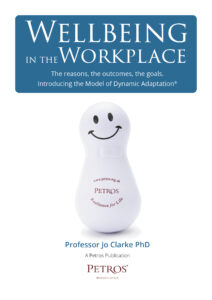Do You Know How to Empower Your Staff to Thrive?

Asking staff what they love and what gets in the way!
Empowering people to thrive at work is challenging, not least because of how complex and diverse we all are.
And because of the dynamics that result from a myriad of different mental ill-health outcomes when we fail to thrive. Petros offers a range of solutions, interventions and strategies to enhance the psychological wellbeing of your employees.
Introducing the Model of Dynamic Adaption® (MDA)
To help make sense of the myriad factors that impact on our mental health, we base our solutions on The Model of Dynamic Adaption®. The Model was created as a result of research into why some people thrive and others don’t, encapsulating the fact that our mental health is in constant motion. If organisations can respond flexibly to the dynamics of employee wellbeing, there is a much higher chance of maintaining good mental health for most of us, most of the time.
What you already do well and should keep doing
Before making wholesale changes to how your organisation responds to the mind health of your staff, it is important to consider what you already do well.
This is best arrived at by asking staff what they like, enjoy, even love about their work. Responses can be used as building blocks for enhancing mind health at work. If you’d like to test this out, go into any branch of Timpson’s and ask the staff about working for the organisation – seriously! This organisation has absolutely got it right. Richer Sounds is another organisation who knows how to keep its staff happy.
Equally, you can ask your staff what gets in the way of having a good day at work. Then work to remove as many of these ‘blockers’ as possible, or find other solutions – often they are very simple things.
Culture’s part in the perception of mental health
It’s also worth considering that culture plays a significant part in how we perceive “mental health” – our tolerance, understanding and treatment of it. Physical health, by comparison, is treated pretty much universally the same, irrespective of culture. A migraine in the UK is a migraine in Uganda. But anxiety may be defined or treated very differently, depending where in the world you are.
Diagnosis, assessment, onset, recovery, and prognosis are usually objective, clear and understood where our physical health is concerned. A broken limb is usually attributable to a known cause, can be objectively assessed by x-ray, has a predictable recovery period and a known prognosis.
Awareness as a foundation for education, training, change
Where our mind health is concerned diagnosis can be tricky, assessment is largely based on clinical judgement (despite the existence of hefty diagnostic manuals), onset and recovery can be hard to define, and the prognosis is often unclear. With a lack of certainty, we often feel ill-at-ease or even fearful of mental ill-health in a way we don’t with physical ill-health, and this can impact on our tolerance and acceptance of it in the workplace. There is not an easy solution, but an awareness of these differences can provide a foundation for education, training and change.
When it comes to how to empower your staff to thrive, if you’d like to learn more, our eBook, Wellbeing in the Workplace, provides some practical guidance. It discusses, simple concepts like use of language, organisations might usefully consider referring to mind health rather than mental health. Mind health holds no pejorative connotations and is more inclusive of the psychological, emotional and social aspects of our wellbeing.
Learn more about Petros Founder and Managing Director, Professor Jo Clarke PhD and her highly experienced team.






